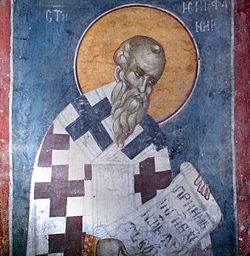For those of us who are converts to the Orthodox faith, it is sometimes tempting to go to extremes in our zeal for this new way of life. We often become rigorous in our discipline and critical of “cradle” Orthodox Christians for what appears to us as laxity. It should not be a surprise to us that this phenomenon has even affected one of the saints of the Church.
St. Epiphanius is sometimes called “Epiphanius the Jew”, as he was born into a poor Palestinian Jewish family around the year 310. He was fortunate in that a wealthy Jewish merchant befriended him and made it possible for him to have an education. The merchant also bequeathed his estate to Epiphanius, allowing him to pursue his interests without financial worries.
Through the influence of Christian friends, Epiphanius became convinced of the truth of Jesus Christ as the expected Messiah and he and his sister, Callithrope, were baptized. With characteristic fervor, Epiphanius began a study of the Scriptures and the writings of the Fathers. In order to study in the original languages, he learned Greek, Latin, Syrian, and Egyptian as well as his native Hebrew. For this reason, Epiphanius also earned the name “Pentaglosson” or “Five-tongued”.
By the age of 26, Epiphanius had decided that he needed to give his whole life to God by becoming a monk. He first lived in the monastery of St. Hilarion, with whom he established a strong friendship and from whom he learned to lead an ascetic life of prayer and study. Then, with the money he had inherited, Epiphanius founded his own monastery in Egypt and served as the Abbot for five years. During this time, his reputation for holiness of living and wise counsel spread throughout the land. He was also known for defending correct theological ideas. Living in this time of speculation and innovation, with various heresies swirling around him, Epiphanius was a stalwart defender of Orthodoxy.
At the recommendation of St. Hilarion, Epiphanius was selected as the Bishop of Salamis on the island of Cyprus in 367. The bishop continued to live as a monk; he took special care of the poor; and he was revered by all around him as a holy man. Even during the persecutions by the Arian Emperor Valens in 371, Bishop Epiphanius was spared because of the esteem in which he was held.
In his writings, Epiphanius undertook to uphold Orthodox doctrine. Ancoratus (“well-anchored”) and Panarin (the “medicine chest”) refute many heretical views then commonly held. Reading the works of Origen, Bishop Epiphanius was shocked to find theological errors and he was very vocal in warning people about them. The Appolinarists received his censure, but his most ardent objections were for the Arians, which he condemned at every opportunity.
Epiphanius set out on a journey in 376 to visit some of the most important Church centers. In Antioch, he endeavored to persuade Bishop Vitalis to abandon his Apollinarist views. In Bethlehem, he tried to get St. Jerome to break communion with those around him because of what he perceived as “creeping error”. In Jerusalem, he preached against Origenism which he suspected the Patriarch of leaning toward. And in Constantinople, he seemed to side with the Emperor against the Patriarch, St. John Chrysostom, who was taking a more pastoral approach to dealing with a local problem.
St. Epiphanius may not have made many friends on this journey, but no one could dispute his Orthodoxy or his love of God and the Church. When his travels were over, he set sail for Cyprus but died on his return voyage in the year 403. Having lived more than 90 years; having embraced Christianity with great ardour; and having faithfully taught and defended the faith of the Apostles, St. Epiphanius could now take his rest in the Lord. May we seek his intercessions that we may also defend Orthodoxy and serve God faithfully in his Church.
